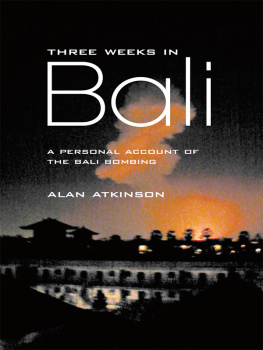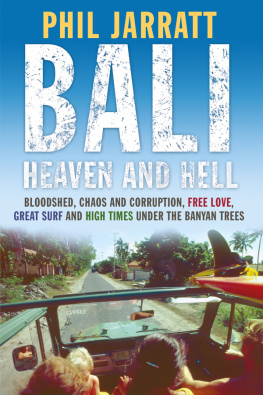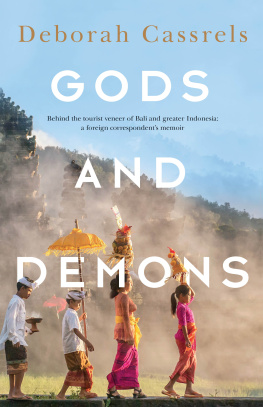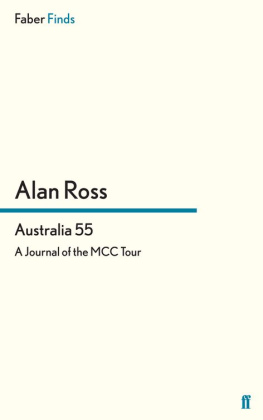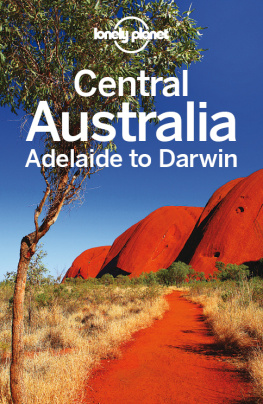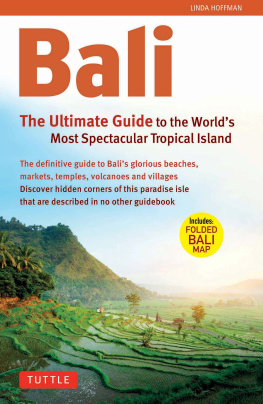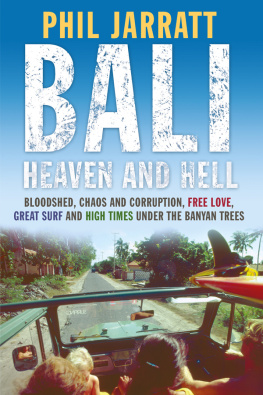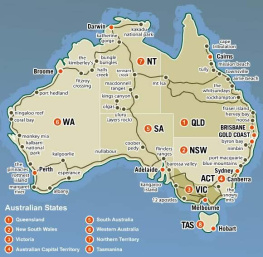This book is dedicated to the victims of the Bali bombing, their relatives and friends.
The Bali bombings have been a turning point. Carefree tourists and honeymooners have long flown to Bali from Australia and many other countries. They have been looking for a holiday with a difference and a brief taste of Asia in what has been a safe haven away from violence in other parts of the region.
Now that has changed. Kuta Beach, its nightclubs, bars and cheap shopping are no longer an attractive lure for many young people and probably wont be for some time to come. And it may be a long time before other tourists return to sample the islands rich Hindu traditions, temples, breathtaking scenery and the legendary friendliness of its people.
I was in Bali on holiday with my family when the bombs went off at Paddys Bar and the Sari Club. So I was one of the first Western journalists to file from the scene. When the ABC asked if I would write down my diary, I agreed because I knew it would be helpful to me to put on paper as much as I could remember in the post-bombing blur, as a way of trying to make sense of the incomprehensible.
But we all have our own experiences of the Bali bombing relatives, friends, emergency and medical workers, holidaymakers, local business people, tourism operators, politicians, onlookers. If the story helps anyone else gain some useful perspective on the tragedy, then all to the good.
This holidays arrived too quickly. I wanted to look forward to it more. I was still at work in Adelaide only yesterday, producing the 7.00 p.m. television news, and now were on the plane to Darwin on the first leg of the journey to Bali.
I guess its always the same with holidays. You plan them but then theyre upon you before youve had a chance to relish the fact that youre finally going to be away from work for a good two weeks. It was only on the way to the airport that we all started to get excited.
My wife Margies already asleep across the aisle. She needs a break too. She works for a busy care agency. Im hoping the holiday will be good for her, that it wont take too long for us all to wind down, that none of us gets Bali belly and that its as interesting for the children as it was for me when I first visited the island.
That was twenty years ago. Everyone was saying then that Bali had been ruined by tourists but it was my first time and I loved it, motorcycling all over the island and meeting some of the friendliest people. Pujiana was one. He was manager of a little homestay called Munut Cottages set in rice paddies just outside the artistic centre of Ubud.
Pujiana was delightfully gentle, charming and polite, with the readiest of smiles. Like so many other Balinese. How is it that they smile so easily? I remember after that holiday coming home smiling more. I wonder if the same thing will happen this time?
Pujiana was young, dark and handsome then. Now he must be middle-aged and handsome. He took me to his village to see his family. Most of them were woodcarvers. He was the only one with a job in tourism. All his money was going towards looking after his extended family of twelve, from grandparents to newborn baby.
When he drove me to meet his family, we stopped on the way to see a spectacularly colourful Hindu cremation, at which a whole village was present. That and meeting his family were two of the highlights of my 1982 visit. I wonder if hes still there? Maybe hes rebuilt Munut Cottages? Perhaps hes moved on to manage a luxury hotel in Sanur or Nusa Dua? Id love to see him and his family again.
Pujianas story was like that of so many other Balinese, a story of working hard in the ever-burgeoning tourism industry to provide for a family back in a village somewhere off the beaten track. In Bali, family ties are strong in the villages, as are religious rituals. Every village has its temples. Unlike the rest of Indonesia, Bali is mainly Hindu but their religion includes other beliefs as well, such as animism. Theres a sense of an all-pervasive spirituality that seems to bind the people so strongly to their surroundings that they seem to work with it and be at one with it in ways that I, a Westerner, find hard to understand. Perhaps its similar to Aboriginal Dreaming.
Of course the regular public performances of fire dances and other dramatic rituals are well-honed for the hordes of tourists but behind the shows it seems the ancient traditions and stories still mean a great deal to the ordinary Balinese. There doesnt appear to be the same disconnection between faith and daily life that seems so evident in Western culture. Perhaps thats partly because not many of the remote villages have television.
Some Westerners, of course, would say the Balinese sense of spirituality is more like superstition. I like to keep an open mind.
As the Qantas 737 drones on across Central Australia to Darwin, I wonder if our two children will get the same chance as I did to sample some of the Bali thats off the tourist routes?
Our fourteen-year-old daughter Sarah has just started learning Indonesian at high school so I think shell get quite a lot out of the holiday. Our son, Nick, is on the edge of being a teenager and more into downhill bike riding, computer games and cricket than being with his parents. I hope hes not too bored. That could be a pain. Friends who have been to Bali this year have enthused about the snorkelling, as well as the shopping, and one of their boys is the same age as Nick.
Anyway, we have half a day in Darwin to get used to the tropical warmth after the dryness of Adelaide. I want to see the Parliament House there. That could be the first test of interest or boredom. We shall see.
The hours in Darwin before the late night flight to Denpasar have gone well, though our eleven-year-old son was clearly a little perturbed after noticing a group of white and Aboriginal Darwinians noisily drunk in the street. Hed not seen that in Adelaide. Drinking in outdoor places in the city centre has been banned there.
We went to see the Northern Territory Parliament House, which to my eye is magnificent as well as huge. Our politicians really do like grand buildings, dont they? Did they really need it that big?
For what its worth, I think I prefer the main hall of the Darwin building to that of Parliament House in Canberra. Theres a touch of Asia about the design that matches my mood.
The Darwin art gallery is impressive. Im not a great connoisseur of Aboriginal art but I know what I like, as they say. Theres a touring exhibition on at the moment with some fabulous work on display. I wonder how many Australians from the big cities really make an effort to get out to see Aboriginal art or learn about it? I include myself as one of the lazy ones.
After visiting the gallery we walk on the beach then sit at an outdoor restaurant in the centre, drinking copious amounts of water. Margies already enjoying the humidity. She once worked in Far North Queensland and loves this kind of all-encompassing warmth. I like it too. Some people cant stand it. Sarah and Nick are also coping well with the change of climate. Theyll need to because according to the weather forecast Balis going to be even hotter.

